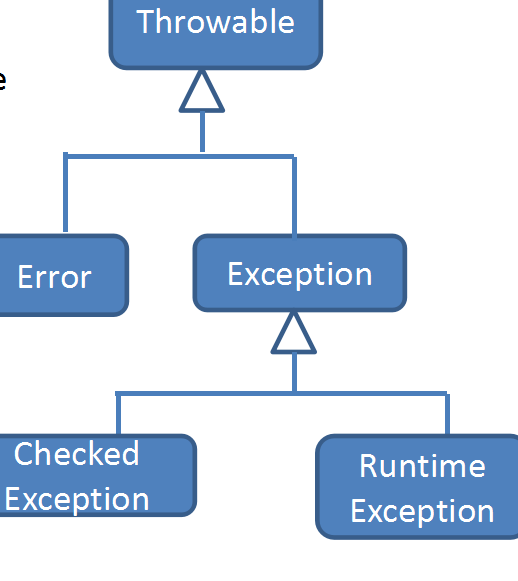Exceptions in Java(异常)
Errors
An Error is any unexpected result obtained from a program during execution.
Unhandled errors may manifest themselves as incorrect results or behavior, or as abnormal program termination.
Errors should be handled by the programmer, to prevent them from reaching the user.
Some common types of program fault
Logic errors - the program does not match the specification (e.g. the requirements, or design)
Divide by zero
Exceeding array bounds
Using an uninitialised variable/object
…
Error Handling
Traditional Error Handling
Return a special value,
e.g., -1 or EoF
Shortcoming:
hard to distinguish different errors
programmer must remember the meaning of different values
Have a global error handling routine, and use some form of “jump” instruction to call this routine when an error occurs
Shortcoming:
“jump” instruction (GoTo) are considered “bad programming practice”
Exceptions in Java
Exceptions:
In Java, errors can be handled by exceptions
Exceptions act similar to method return flags, but can provide more meaningful information
Exceptions can be handled at local and/or global levels
The classification of exceptions in Java
Error:
For internal errors and exhaustion situations in runtime
We cannot do too much for these errors
Exception:
Runtime Exception:
The program has some bugs, e.g., number/0
Again, we cannot do too much…
Checked Exception:
produced by failed or interrupted
I/O operations, e.g., cannot find a file

deal:
Throwing and catching
An exception can be thrown, i.e., do not handle the error in this method, but throw it to where it is called
public void aMethod() throws Exception{
}
Or
can be catch, i.e., handle it here.
try{
…
} catch(ExceptionType e){
//statements that handle the
//exception
}
public class Exceptiondemo {
public static void main(String[] args) {
Exceptiondemo ex=new Exceptiondemo();
ex.divide(1, 0);
}
public void divide(int x, int y) throws ArithmeticException {
int result= x/y;
}
}
public void divide(int x, int y) throws ArithmeticException {
try{
int result= x/y;
}catch (ArithmeticException e){
System.out.println("Cannot divided by 0!!");
}
}
The finally block
The finally block always executes when the try block exits.
This ensures that the finally block is executed even if an unexpected exception occurs.
try {
} catch (ExceptionType1> e) {
// statements that handle the exception
} catch (<ExceptionType2 e) {
// statements that handle the exception
} finally {
// release resources
}



